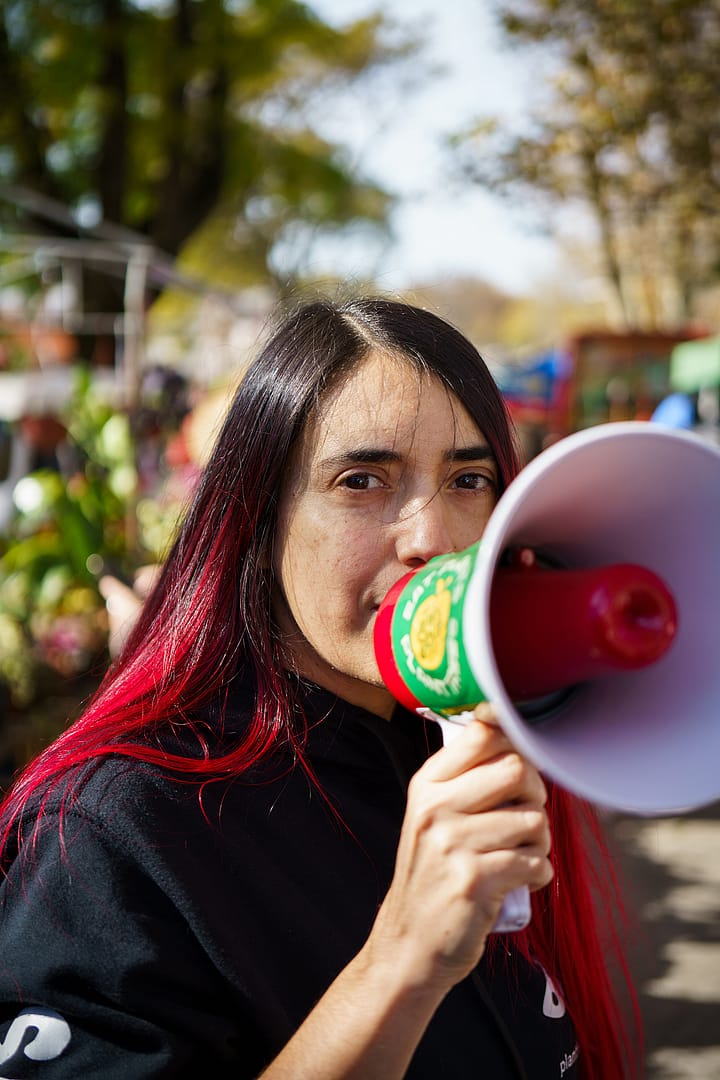“In Latin America we face a lot of injustices and a constant violation of basic human rights….so I started to question and connect different forms of both human and animal oppression…..we connect all of these causes because the fight for animal rights is part of the resistance against social inequality….”

Azul Cardozo won’t admit to being an animal activism trailblazer in Latin America, but the lawyer, advocate, and punk guitar player has lent her time, energy, and passion to numerous organizations, including The Animal Save Movement, Direct Action Everywhere, The Plant Based Treaty, Uruveg, The Earthling Experience, and many more. Though she remains humble about her tireless work leading and organizing others, all who have worked with her know that she has undoubtedly grown the movement for animal rights in Latin America.
About seven years ago, Cardozo started down the path of vegan activism. Inspired by punk music, she joined a hardcore punk band, which, she says, “made me start questioning everything,” including capitalism, human rights, and animal rights.
“Punk and the animal rights movement have always acted together to challenge the system,” Cardozo explains. “Beginning in the 1980s, this communion was reflected in the emergence of songs, fanzines, animal rights concerts, and the militancy of punk-influenced activists through multiple and historic direct actions. The punk movement was a pioneer in instilling animal rights practices and concepts into the collective consciousness.”
For Cardozo, connecting with the punk music community was, she says, “the start of everything;” the start of learning more about animal exploitation, going vegan, and getting active for the animals.


The cultural context of Latin America has also played a role in Cardozo’s activism.
“In Latin America we face a lot of injustices and a constant violation of basic human rights,” she explains, “so I started to question and connect different forms of both human and animal oppression.”
This context, however, is also the greatest challenge Cardozo and the animal rights community in Latin America faces, she says.
To tackle this, Cardozo helped organize the first vegan soup kitchens in Uruguay to feed those in need. At the same time, she connected with the community and spread the message about animal rights within the context of aiding human rights.

“We work with the community, and we connect all of these causes,” she says, because “the fight for animal rights is part of the resistance against social inequality in Latin America.”
When she first started organizing animal actions in Colombia, she says recruiting others to join was hard.
“The oppression that people experience on a daily basis often causes them to lose hope in the struggle. Injustice in all areas is normalized,” she says.
In fact, she adds, it could be dangerous to speak out. “Latin America is the region of the planet where human rights are most violated, as well as the region where most social defenders are assassinated,” she adds. “Colombia continues to be the country with the highest number of human rights defenders murdered in Latin America and with the highest rate of impunity.”

Animal liberation activist Azul Cardozo holds up a blue smoke flare and a photograph of a farmed pig confined inside a crate in Montevideo, Uruguay. Azul is protesting in front of a well-known shopping mall in Montevideo as part of a an action she has organized for National Animal Rights Day. Photo credit: Martina Victoria Zamudio / We Animals
Despite this however, Cardozo says every day more people are willing to take the risk by using their voice to help both human animals and non-human animals. “We now have a large animal rights community,” she says, noting, more generally, that a greater openness of collective consciousness regarding animal exploitation has emerged. This growing interest in animal rights in Latin America is now helping Cardozo get more people involved, including touring other countries with The Animal Save Movement and Plant Based Treaty, and helping to start additional chapters across the continent. “When you want to do something, you really put all your effort into doing it,” she says.

Activist Azul Cardozo’s favourite element is water, and here she poses next to the ocean shore in Montevideo, Uruguay after a full weekend of action and activism. Photo credit: Martina Victoria Zamudio
Looking ahead, Cardozo says the strategy is to connect with other groups fighting not just for animals but for people, the planet, and for changes to the food system.
“The movement is growing and getting stronger,” she says, “because we are making alliances with other organizations that have different approaches.”
The goal, she says, is to spread the anti-oppression message, connect animal agriculture to the climate crisis, further open up collective consciousness about how all these issues are interconnected, and seek “collective liberation.”
Article by Jessica Scott-Reid
Photos by Martina Victoria Zamudio


